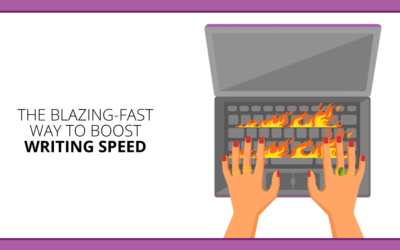
If you’re working for low-paying clients barely getting by, it’s a pretty frustrating place to be.
But if you want to change your situation and increase your freelance income, you can’t keep doing the same things, working for the same clients, and expect anything different.
If you really want to grow your freelance income and learn how to make money writing, sometimes you have to take a step back, and take a closer look at what you’re doing right, and what you need to change.
Improve your marketing efforts. Find better clients. Get a better handle on how you’re using your time. Raise your rates.
It might seem like big to-do list, but you don’t have to change everything all at once. You just need to be strategic about it to move up and earn more.
When freelance writer Sylvie Tremblay’s found herself tired, broke, and desperate for work, she made a mindset shift, changed her approach to running a business, and managed to triple her freelance income. Here’s how it’s done:
Motivation to triple your freelance income
Sylvie Tremblay spent the first years of her freelance career teetering on the brink of financial disaster-and sometimes falling off the edge.
She struggled to pay rent. Late checks from clients made paying her bills stressful. She even lived in her parents basement. Sound familiar?
When she finally reached the tipping point, she got help from the Den 2X Income Accelerator, made big changes to her writing business and tripled her freelance income. If you’re ready to move up, and earn more, check out this Q&A with Sylvie Tremblay.
Q: Where was your career when you came into Den 2X?
A: I was doing a medium volume of work at really low pay. Even though I worked consistently, it didn’t add up to enough. I covered my bills but lived paycheck to paycheck.
Any financial emergency could have wiped me out. That did happen in 2011. I had to move in with my parents for a year. I moved back out, but I was still not grown-up secure.
Also, I had not diversified my income. If anything happened, a big chunk of my income would have been gone.
Q: What types of writing were you doing?
A: I focused on website content and articles in the range of $30-$50. I wasn’t doing a lot of research, interviews, or technical topics that command higher pay.
Q: What motivated you to go after better clients?
A: When I analyzed my clients in Den 2X, I realized how low some of the hourly rates were. I asked, “What is this worth per hour? Which clients are more valuable and who is paying me lower than I expected?”
I pinpointed those lower paying gigs by looking at cost per hour, which is a basic freelancer thing, but it’s hard to do when you’re struggling.
Q: How did you overcome your fear that you weren’t good enough to go after serious big-money clients?
A: I learned how to write for non-academic people in a way that’s really fun. I came into this with a science background, which is good for some things, but not for knowing how to write in an approachable way. I also didn’t study marketing in school, so I had to learn those skills.
I also had to do a “mindset reset” and start telling myself, “I am a good writer. Most people cannot talk about this topic in a fun way.” Knowing my strengths gave me confidence to take on harder assignments.
Getting support also helped. I could go into the Den 2X chat room and say, “This is so difficult!” And other people said, “Yeah, I struggle with that too.”
Q: What were your first steps to create change and start grow your income?
- A: Leveraging my strengths. I can write quickly. At first I didn’t recognize the value of that, but now I’ve turned that into doing rush work for clients. I’m open to those opportunities and I go after them. Once you know your strengths you can use them to get the assignments you’re best at. That sounds obvious, but it did not occur to me to think like that before.
- Organizing my day to be more productive. I took stock of how much time I was wasting and carved out more writing time. If you get more done, you earn more money.
- Focusing on high-paying clients. I didn’t outright drop clients, but I did ask for raises or take on higher paying work. I identified my banner clients and asked, “Who else can I look at?”
- Going after bigger brands. It seems scary, but they’re willing to pay professional rates, they know your value, and they know how to set you up for success. I’ve had great experiences working with large companies.
Q: What marketing methods paid off for you?
- In-person marketing. I started going out and meeting people. That sounds super obvious, but when we’re self-employed, it’s easy to just stay cozy at home. I went to different groups and started volunteering.
- Networking with editors. I sent letters of introduction (LOIs) and built relationships that way. I also I kept in touch with editors I had worked with in the past. I just got two assignments that way.
Q: What are your best tips for successful networking?
A: Be genuinely happy for other people’s successes, and that positivity comes back to you.
People can tell if you’re only reaching out when it’s like, “What can you do for me?” When I get networking requests like that, I never want to help those people because it’s obvious they’re takers.
Create a positive mindset around your career, and use that to reach out to people. It will boost you and make you happier too.
Q: How have things changed for you financially?
A: My hourly rate has more than doubled. It’s usually a hundred dollars or up.
I do not ever worry about paying bills. I’ve built up an emergency fund.
I’ve also traveled a lot. Next spring I’m heading to Portugal. That’s why I’ve stayed in my studio apartment-I have a low cost of living and can afford to travel. It’s the freelance dream everyone talks about.
I lost a client this year. That affected my cash flow, but I replaced it. If you’re paying attention and guiding your career, losing one client won’t sink you.
Q: How can freelancers position themselves for success?
A: The business comes first, not the writing. Being a real writer means thinking about a marketing goal, both for yourself and for your client.
You’re a business owner helping other business owners. That changes the way you look at assignments.
You need to care about what you’re doing and your client’s success. When you have the confidence to think of yourself as an equal member of a team, you’re able to make that hard sale and put that confidence into your work. That’s why clients keep coming back.
You can move up and earn more
Earning well can be especially challenging for writers who don’t have years of work or writing experience to draw from. But as Sylvie proves, you don’t need to settle for miserable rates. Adjust your mindset, use your time well, and reach for the clients you deserve.
What keeps you from earning big? Let’s discuss on Facebook and LinkedIn.
Maria Veres is a freelance writer based in the Oklahoma City area. She contributes regular Q&A blog posts to Make A Living Writing.











